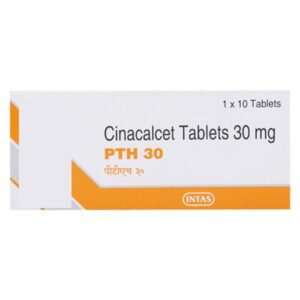CINACALCET
CINACALCET: Cinacalcet is a drug used primarily in the treatment of hyperparathyroidism, a condition characterized by overactivity of the parathyroid glands, leading to excessive levels of parathyroid hormone (PTH). It is also used to manage hypercalcemia, a state of excessively high calcium levels in the blood that can be caused by certain types of cancer and other medical conditions.
The mechanism of action of cinacalcet involves targeting and binding to the calcium-sensing receptors (CaSR) on the parathyroid gland cells. By doing so, it enhances the sensitivity of these receptors to extracellular calcium levels, which in turn leads to a decrease in the production and secretion of PTH. As a result, cinacalcet helps to normalize calcium levels in the body.
The typical starting dose of cinacalcet is 30 mg, taken orally once daily. This dose can be adjusted based on individual response and titrated up to a maximum of 180 mg per day. It is important to follow the instructions provided by the healthcare provider regarding dose adjustments and duration of treatment.
Like any medication, cinacalcet may have certain side effects. The most commonly reported side effects include nausea, vomiting, diarrhea, loss of appetite, and low blood calcium levels (hypocalcemia). Some individuals may also experience dizziness, headache, muscle pain, and a tingling sensation in the extremities. It is essential to report any severe or persistent side effects to a healthcare professional.
Cinacalcet should not be used by pregnant or breastfeeding individuals, as its safety in these populations has not been established. It is also contraindicated in individuals with a known hypersensitivity to the drug or any of its components.
As with any medication, it is important to consult a healthcare professional or pharmacist for specific instructions, as well as potential drug interactions or precautions before starting cinacalcet.

